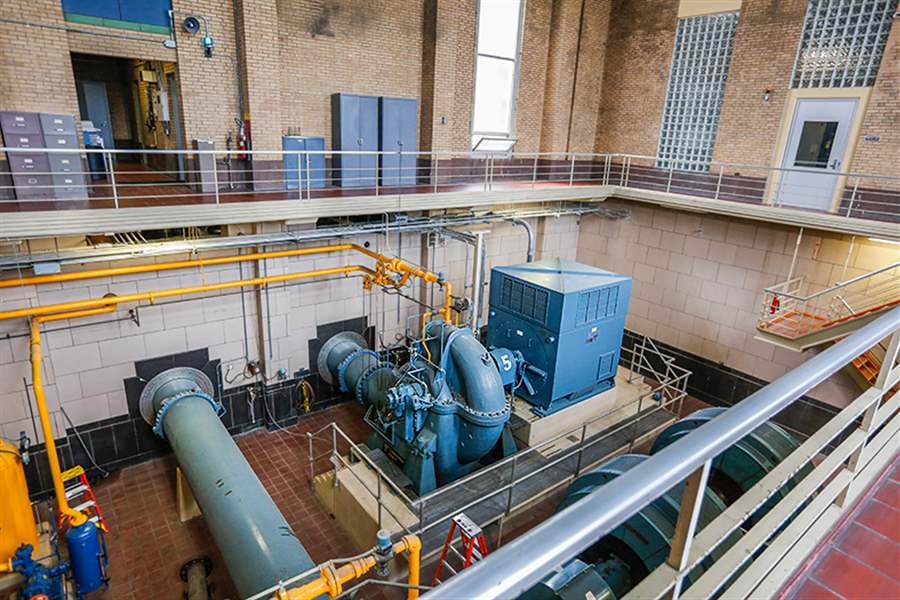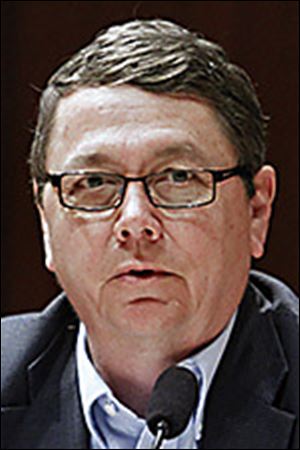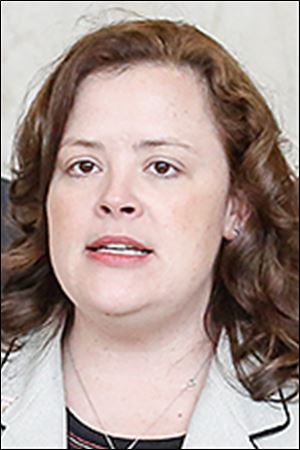
Council, county officials voice surprise at possible EPA action
Mayor says state never hinted at taking over water plant
8/11/2014
Mayor D. Michael Collins says that Ohio EPA Director Craig Butler did not mention the possibility of an agency takeover of the Collins Park treatment facility.
THE BLADE/JETTA FRASER
Buy This Image

Mayor D. Michael Collins says that Ohio EPA Director Craig Butler did not mention the possibility of an agency takeover of the Collins Park treatment facility.
If the head of the Ohio Environmental Protection Agency had said two months ago that he was thinking of taking over the city’s water treatment plant, Councilman Rob Ludeman would have been surprised.
After the events of the last 10 days, not so much.

Ludeman
“Given what happened in the last week, I’m not surprised,” Mr. Ludeman said.

Webb
City Council members reached by The Blade on Sunday and Lucas County Commissioner Pete Gerken said Ohio EPA Director Craig Butler’s frustration at the Collins administration’s seeming lack of urgency in fixing a water system that serves nearly half-a-million people should serve as a wake-up call.
Mayor D. Michael Collins said Sunday night that he met three times in July with the state EPA director and believed the director had confidence in the city’s schedule for upgrading the water plant at Collins Park in East Toledo.
“At no time did Director Butler or any member of his staff suggest to me or imply that they were contemplating taking over our water treatment facilities located at Collins Park,” Mr. Collins said.
In an interview with The Blade about the 73-year-old Collins Park Water Treatment Plant, Mr. Butler said that he entertained the idea of taking control of the plant away from the city.
“Us stepping across that boundary and taking control of that facility is something we try hard not to do,” Mr. Butler said. “But it is our obligation to hold their feet to the fire. We obviously have very strong concerns about the operability and the long-term capability of that plant. If we ever thought it would have jeopardized public health, we would have had that conversation.”
According to Chris Abbruzzese, the Ohio EPA’s deputy director for communications, the possibility of a state takeover of the plant was on the table.
“We were certainly seeing some things that were very disturbing and the situation was probably as close to the precipice of Ohio EPA having to come in as it’s been in any situation statewide in many years,” Mr. Abbruzzese wrote in an email to The Blade.
“It’s shocking,” said Councilman Lindsay Webb, who is chairman of council’s public utilities committee.
“I had no idea. All of this is new to me. I’m an active chairman of my committee, regularly meeting with the administration; they had ample opportunity to communicate with me the concerns of the EPA, and they didn’t do it.”
She added that it’s not a good idea for the EPA to take over Collins Park facility operation and that the EPA’s frustration surprises her, given that the city council enacted water rate increases in 2013, and the city is issuing contracts to carry out $300 million worth of plant improvements.
Councilman Larry Sykes, vice chairman of the committee, said the lack of communication to council is disturbing.
“I, like other council people, was not shared that letter,” Mr. Sykes said, referring to a June 9 letter from Mr. Butler to Mayor Collins stating that the water plant was “vulnerable to potential failures that could severely impact the city’s ability to provide adequate quantities of safe water to its citizens.”
Mr. Ludeman said Mr. Collins is not living up to the promises of transparency he made in his campaign for mayor last year.
“My recollection was that Mayor Collins campaigned vociferously about transparency and I have yet to see it. It’s less transparent than the [Mike] Bell administration was,” Mr. Ludeman said.
The vulnerable condition of the water plant exploded into public view Aug. 2 when, for more than 48 hours, city and regional users of the water system were told that the water was not safe to drink because of a toxin caused by an explosion of algae growth in Lake Erie. City officials said the water advisory was not related to the water plant concerns that were being raised by Mr. Butler. The water was declared safe to drink on Aug. 4.
Mr. Gerken said the latest episode is contributing to a growing lack of confidence in the city’s oversight of the plant, and that the number of consumers who don’t live in Toledo is approaching half.
He said those non-Toledo communities want a say in the operation of the system.
He said the commissioners have put up $175,000 toward the cost of conducting a feasibility study aimed at creating a city-county water treatment authority, and they want the city to put up the other $175,000.
“When you shut down a clean water supply to half a million people, it gets people’s attention, and they start saying things they wouldn’t have said two weeks ago,” Mr. Gerken said of Mr. Butler’s and Mr. Abbruzzese’s remarks.
“The plant needs a huge infusion of capital, the customers are distrustful. People are looking for alternatives more now than ever. It’s time to have a reasonable and rational conversation with everybody.”
Mr. Collins said he’s not interested in pursuing regional water talks. He said the city is in the middle of a performance audit of the Department of Public Utilities, which oversees the fresh water plant at Collins Park and the wastewater plant on Summit Street in North Toledo.
Mr. Collins said he didn’t alert council about the June 9 letter because he wanted to talk to the EPA first and get informed.
“I felt as mayor it was my responsibility to first establish communication with the Ohio EPA and their new director in order to see what has resulted and then report to council what was going on,” he said.
It’s not clear whether that meeting, which the mayor said occurred in July, resolved Mr. Butler’s concerns about the city’s water treatment plant.
“I can’t say they were satisfied with the pace. The impression I had was they recognized there was not going to be a resistance and we were moving forward with our plans,” Mr. Collins said.
He said he saw Mr. Butler on two other occasions in Toledo: when Gov. John Kasich came to Toledo to help kick off a dredged materials demonstration project and when Mr. Butler toured the wastewater treatment plant.
“He never said to me at any point in time that he had concerns about Collins Park,” Mr. Collins said.
“I felt at that time that everything was going. Council had approved the contracts, they were going along on schedule, I hadn’t seen any change orders which would indicate a problem,” Mr. Collins said about not raising an alarm with council.
“We have two of the top engineering companies in the world — Black and Veatch and Arcadis — under contract and providing their expertise. I have far more confidence in the professionalism of these two organizations than I do with Commissioner Gerken,” Mr. Collins said.
Contact Tom Troy: tomtroy@theblade.com or 419--724-6058 or an Twitter @TomFTroy.